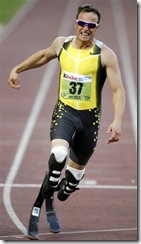
JOHANNESBURG, South Africa - Double-amputee sprinter Oscar Pistorius hopes that independent tests will show that he does not get an unfair advantage from his prosthetic racing blades.
The IAAF, track and field’s world governing body, ruled Monday that the South African is ineligible to compete at the Beijing Olympics — or any other sanctioned able-bodied competition — because his “Cheetah” prosthetics give him a clear competitive advantage.
“I was pretty surprised by the outcome,” Pistorius said Tuesday in an interview with Associated Press Television News. “Because some of the details had come out we were anticipating it, but it was still a big shock and I was pretty disappointed.”
The IAAF ruling was based on studies it commissioned by German professor Gert-Peter Brueggemann, who conducted tests on the prosthetic limbs and said they gave Pistorius a mechanical edge.
Pistorius again disputed that claim Tuesday.
“My goal was to qualify for the Beijing Olympics and I was 0.8 seconds off for the South African qualification time,” he said. “The company that makes my prosthetics is pretty confident they don’t give me an advantage.”
“We have given the results to some university professors of biokinetics in the U.S. and they strongly believe I do not have an advantage,” Pistorius said. “We are hoping to redo the tests at an independent level.”
Pistorius said the IAAF tests were done “very professionally” but added that other experts had told him the tests were not comprehensive enough.
“I am sure the whole thing will be sorted out in the next few months,” he said.
His manager, Peet van Zyl, said they were getting legal advice before lodging an appeal.
“The onus is on us to prove that Oscar does not receive an advantage from his blades,” Van Zyl said. “We will have to do our own independent tests. We don’t believe this is the end of the road for us.”
Pistorius was due to leave for a training camp for the Beijing Paralympics in Cape Town.
Pistorius, nicknamed the “Blade Runner,” had announced last week that he planned to appeal any adverse decision, including taking the case to the Court of Arbitration for Sport in Lausanne, Switzerland.
Pistorius has set world records in the 100, 200 and 400 meters in Paralympic events.
Pistorius finished second in the 400 meters at the South African national championships last year against able-bodied runners.
Even if the IAAF decision was overturned, he would still need to qualify for the South African team to race at the Beijing Olympics. The athlete said his schedule would be seriously affected by the ruling because about 80 percent of his races are able-bodied events.
Pistorius was born without fibulas — the long, thin outer bone between the knee and ankle — and was 11 months old when his legs were amputated below the knee.
He began running competitively four years ago to treat a rugby injury, and nine months later won the 200 meters at the 2004 Paralympic Games in Athens.
